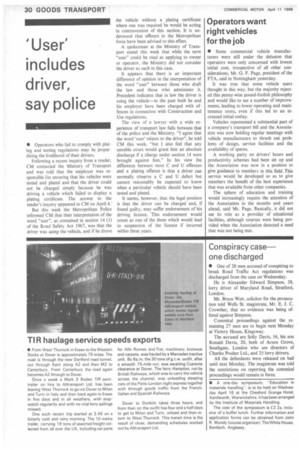'User' includes driver, say police
Page 32

If you've noticed an error in this article please click here to report it so we can fix it.
• Operators who fail to comply with plating and testing regulations may be jeopardizing the livelihood of their drivers.
Following a recent inquiry from a reader, CM contacted the Ministry of Transport and was told that the employer was responsible for ensuring that his vehicles were tested and plated and that the driver could not be charged simply because he was driving a vehicle which failed to display a plating certificate. The answer to the reader's inquiry appeared in CM on April 4.'
But this week the Metropolitan Police informed CM that their interpretation of the word "user", as contained in section 14 (1) of the Road Safety Act 1967, was that the driver was using the vehicle, and if he drove
the vehicle without a plating certificate where one was required he would be acting in contravention of this section. It is understood that officers in the Metropolitan force have been advised to this effect.
A spokesman at the Ministry of Transport stated this week that while the term "user" could be read as applying to owner or operator, the Ministry did not consider the driver as such in this case.
It appears that there is an important difference of opinion in the interpretation of the word "user" between those who draft the law and those who administer it. Precedent indicates that in law the driver is using the vehicle—in the past both he and his employer have been charged with offences in connection with Construction and Use regulations.
The view of a lawyer with a wide experience of transport law falls between that of the police and the Ministry. "I agree that the word 'user' relates to the driver", he told CM this week, "but I also feel that any sensible court would grant him an absolute discharge if a charge under section 14 were brought against him." In his view the difference between most C and U offences and a plating offence is that a driver can normally observe a C and U defect but cannot reasonably be expected to know when a particular vehicle should have been tested and plated.
It seems, however, that the legal position is that the driver can be charged and, if found guilty, may suffer endorsement of his driving licence. This endorsement would count as one of the three which would lead to suspension of the licence if incurred within three years.












































































































































